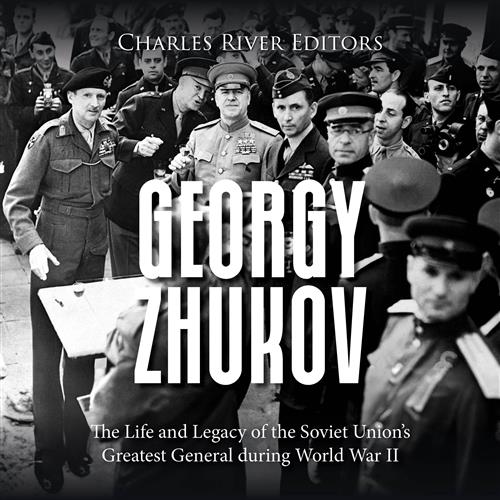F
Frankie
Moderator
- Joined
- Jul 7, 2023
- Messages
- 101,954
- Reaction score
- 0
- Points
- 36

Free Download Charles River Editors, Steve Knupp (Narrator), "Georgy Zhukov: The Life and Legacy of the Soviet Union's Greatest General during World War II"
English | ISBN: 9798868707858 | 2024 | MP3@64 kbps | ~01:57:00 | 54 MB
The Soviets were so caught by surprise at the start of the attack that the Germans were able to push several hundred miles into Russia across a front that stretched dozens of miles long, reaching the major cities of Leningrad and Sevastopol in just three months. The first major Russian city in their path was Minsk, which fell in only six days. In order to make clear his determination to win at all costs, Stalin had the three men in charge of the troops defending Minsk executed for their failure to hold their position. This move, along with unspeakable atrocities by the German soldiers against the people of Minsk, solidified the Soviet will.
For the next several years, the vast expanses of southern Russia and the Ukraine comprised most of the Eastern Front, where the two sides wrestled lethally for supremacy. Endless rolling plains, vast forests, sprawling cities, and enormous tracts of agricultural land formed the environment over which millions of men and thousands of the era's most formidable military vehicles fought for their respective overlords and ideologies. If Hitler's Wehrmacht smashed the Red Army, he might not be able to hope for a lightning conquest, but the Fuhrer could expect the Soviet strongman to sue for peace on terms advantageous to Germany. If, conversely, the Red Army triumphed, Stalin could continue rallying the Soviet Union and move closer to expelling the loathed "Nemets" invaders from Russian soil - and perhaps carve out an empire in Central and Eastern Europe.
Asserting that changes in the military leadership style of the two contending dictators explains the outcome of Kursk oversimplifies the actual situation. Logistics, the emergence of a body of experienced junior officers in the Red Army, American Lend-Lease shipments, German production problems, and other issues all contributed to the observed result. However, the overarching factor tying everything together remained the changing approach of each leader to their army. At the start of the war, Hitler gave his commanders considerable initiative while Stalin fatally micromanaged his, and the Germans ripped vast hordes of Soviets to shreds with comparative ease. In late 1942 and moving into 1943, Hitler commenced micromanaging the Wehrmacht, and Stalin adopted a more "hands-off" approach permitting his commanders considerable initiative. Though the Wehrmacht remained too formidable and professional to collapse as readily as the appallingly low-quality Red Army had in 1941 and early 1942, the Red Army slowly got the upper hand and achieved strategic offensive momentum. That the shift occurred at the moment when Hitler hamstrung his generals with his melodramatic obstructionism while Stalin gave his some operational breathing room was probably no accident.
Of the Soviet generals, none played as crucial a role in the war as Georgy Konstantinovich Zhukov, one of the most highly decorated army officers in Russian military history. At critical stages during the Second World War, it seemed as if it was Zhukov alone who stood between Russian defeat and German victory. Zhukov was ultimately involved in all the major battles on the Eastern Front, including Moscow, Leningrad, Stalingrad, Kursk, Bagration, and the final assaults into Poland and Germany to capture Berlin. Stalin came to depend on Zhukov's ruthless military skills for victory, but in the cut-throat Soviet Union, that was always a double-edged sword, because it seemed that Stalin envied Zhukov and feared him as well. Zhukov, who could be as aggressive and blunt as Stalin, was one of the few people prepared to stand up to the Soviet dictator and argue with him, and as many Soviet politicians and generals learned to their detriment, going toe to toe with one of the most brutal leaders of the 20th century was a highly risky venture. However, the mutual understanding they forged as they confronted the Germans may have played the biggest role in Hitler's demise.
Recommend Download Link Hight Speed | Please Say Thanks Keep Topic Live
Links are Interchangeable - No Password - Single Extraction
